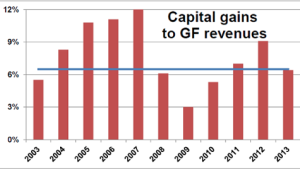Assembly Speaker John Perez has announced his support for a ballot measure establishing a new “rainy day reserve” for the state budget. Still to be answered: is his proposal more responsible than the measure already on the November, 2014, ballot? In other words, what is the problem with the measure slated for 2014 that the Speaker wants to fix?
The Speaker has released few details about his proposal, saying only that the new reserve would comprise capital gains revenues in excess of 6.5% of state revenues, and that once the reserve hits 10% of the General Fund, the excess revenues could only be used for one-time uses: debt repayment and infrastructure. In principle, these are good ideas, similar to those found in the 2014 measure.
Had the Speaker’s proposal been in effect for the past decade, the state would have squirreled away $15 billion during the 2004-2007 budget bubble, and would have gathered some $3 billion in reserves as the economy has started its most recent recovery. See chart below, based on Department of Finance data (blue line is 6.5% capital gains threshold).
A careful analysis is impossible without more details, so is a comparison with the 2014 measure. Remember, the 2014 measure, also called ACA 4, was originally placed on the ballot as part of an earlier budget deal between Governor Schwarzenegger and the Legislature. The measure was postponed from the 2012 election as part of the maneuver that sent Governor Brown’s tax proposal to the top of the November ballot list.
As more becomes known of the Speaker’s proposal, here are some of the issues that should be examined:
- Under what circumstances can the rainy day reserve be used by the Legislature? Can it only be used when state finances are under water, as is the case with ACA 4? Or can the Legislature merely use the reserve as a pass-through for more spending, as is the case today?
- What is the definition of debt repayment and infrastructure? Can these categories merely offset spending that would have occurred anyway, thereby freeing up money for increased spending?
- Are excess capital gains the right measure of one-time revenues? It isn’t a bad measure, since analysts have shown that capital gains revenues are a major component of revenue volatility. Still, there are other contributors to volatility, and a rainy day reserve that is tied to the entire revenue stream would be less prone to gamesmanship.
Since a two-thirds vote of the Legislature is required to place a constitutional amendment on the ballot, this proposal would seem to be one of the rare candidates for bipartisan negotiation and compromise – rather than a legislative power play. But given that the measure slated for the 2014 ballot was postponed in just such a power play – requiring only a majority vote of the Legislature (and Governor’s signature) in a “budget related” bill – please pardon our skepticism. After all, it isn’t clear that a majority of the Legislature could not permanently remove ACA 4 from the ballot, leaving the Speaker to dictate a take-it-or-leave-it ultimatum.


